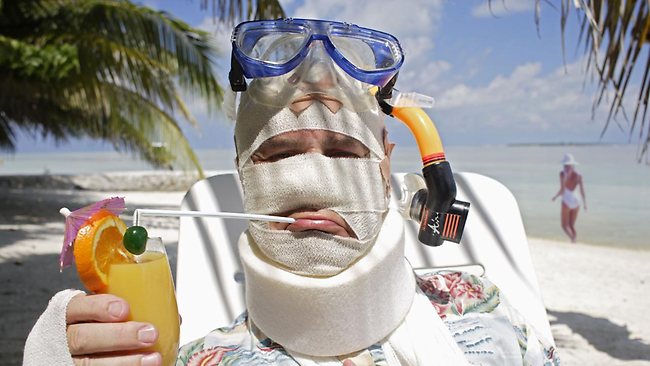
Travel Insurance 101
When planning a vacation, the costs and fees may have you reconsidering if you need that trip after all. Spending a little money on travel insurance, however, can give you peace of mind by protecting the money you spend to get some TLC. Here are a few things to consider when buying travel insurance, as well as tips to ensure you get the best coverage for your trip.

Type of Insurance
Travel insurance comes in many different flavors. When speaking to an agent, make sure they specify what exactly they cover. Here are some of the major types of insurance coverage.
Medical: The most important. Medical insurance can be purchased when traveling to supplement your existing medical coverage. If you don’t have domestic health insurance, this coverage is even more important when traveling to places that may not have an adequate health care system. Ask your agent if this includes medical evacuations (needed you must be transported to a health care facility out of the area).
Cancellation and Interruption: This coverage will prevent loses due to a trip cancellation; covering you if you’ve lost your job, encounter flight delays, become ill, or have to cut your trip short because of an injury or illness. There is also ‘cancel for any reason’ insurance, but may cost 30-40% more than other, more basic policies.
Car: Your current car insurance may not cover you when out of the country, so, in order to prevent your home premiums to sky rocket in case you’re in an accident while away, consider additional car coverage.
Baggage coverage: This covers you in the case of lost or stolen baggage while traveling.
Excess valuation coverage: Some airlines offer basic baggage coverage, but if you are traveling with valuables exceeding the coverage, ask the airline for excess valuation coverage, it may cost you a few more bucks but this way you’ll know your valuables are protected.
Airline and cruise line bankruptcy: When companies declare bankruptcy your trip and you money may go down with them. To ensure your money is secure ask your agent about travel insurance. They will also have a list of what companies do not offer coverage for ‘financial default.’
Know Your Underwriter
When thinking about getting travel insurance, be sure to know the underwriter. If you are booking a trip and agree to travel insurance through your travel agent, have them provide you with the state license number of the actual insurance company.
Insurance company rating: Once you have their information; research them on an insurance company rating website like, ambest.com. You’ll be able to see how they rank among other companies.
Assistance: Make sure the insurance company you choose has a 24-hour emergency line so you know you’ll always be able to reach an agent.
Pre-existing medical conditions waiver: This is a very important feature if you or someone you are traveling with have pre-existing conditions. Ask your agent if they have a waiver; it allow your policy to be accepted and you’ll be covered if complications arise related to your pre-existing condition.
When does coverage begin and end? Make sure you are aware of the parameters of your coverage like when it begins and ends. Some companies cover you from the moment you leave your home to the moment you arrive at your doorstep. Others will only cover you to your destination—in this case, if your “destination” is the airport, and you realize you’re missing your baggage after you’ve landed, you may not be covered.
Where to Buy
When planning your trip, remember that you can purchase travel insurance through an independent insurance company, your travel agent, or a tour operator. Experts suggest that you buy travel insurance on your own. Although you can tack it on to your other expenses (flight, hotel, etc.), it will usually not be the best option for you.
Costs
The costs associated with travel insurance will greatly depend on the following factors: Length of stay, pre-existing conditions, amount of coverage, where you purchase it, and where you will be traveling to. In general, travel insurance can cost you around 3-8% or your overall trip cost. If you plan a trip that will cost about $5,000, your insurance will add anywhere from 150-400. Keep in mind, though, that this costs protects your overall investment.
Your Current Insurance or Credit Card may or may not Cover You
If you decide that travel insurance doesn’t make financial sense to you, do yourself a favor and check with your current health insurer and credit card companies. Some may have the additional coverage you would need in case of an emergency.
‘Out of network’ services: Before taking off, ask your provider if they offer coverage in the area where you will be traveling. If so, get a list of health-care providers in their network.
High-risk activity coverage: If your ideal vacation includes swimming with sharks, you may want to check with your agent about high-risk coverage while on vacation.
Baggage coverage: Some credit cards come with automatic baggage coverage when you travel. Be sure to understand the terms and amounts they cover.
Deciding to get travel insurance can be a tedious task, but the most important thing to do in evaluate and anticipate what you will be doing on your trip. If you know there is a chance that extra expenses may be accrued, it may be worth your while to get travel insurance to cover you in case of unforeseen expenses, delays, or injuries. In the end, it all comes down to an individual’s risk tolerance.
If you feel that travel insurance is not for you, then don’t get it. However if you are the ‘just-to-be-safe’ type, you may want to purchase insurance to keep you at ease. Regardless of your choice, make sure to read the fine print of any travel companies, insurance policies, and your existing providers. Doing so, will guarantee you will be kept out of the dark. Bon voyage!
Kevin Murphy is a former insurance industry professional living in Australia. When not traveling abroad, he blogs about health insurance.





